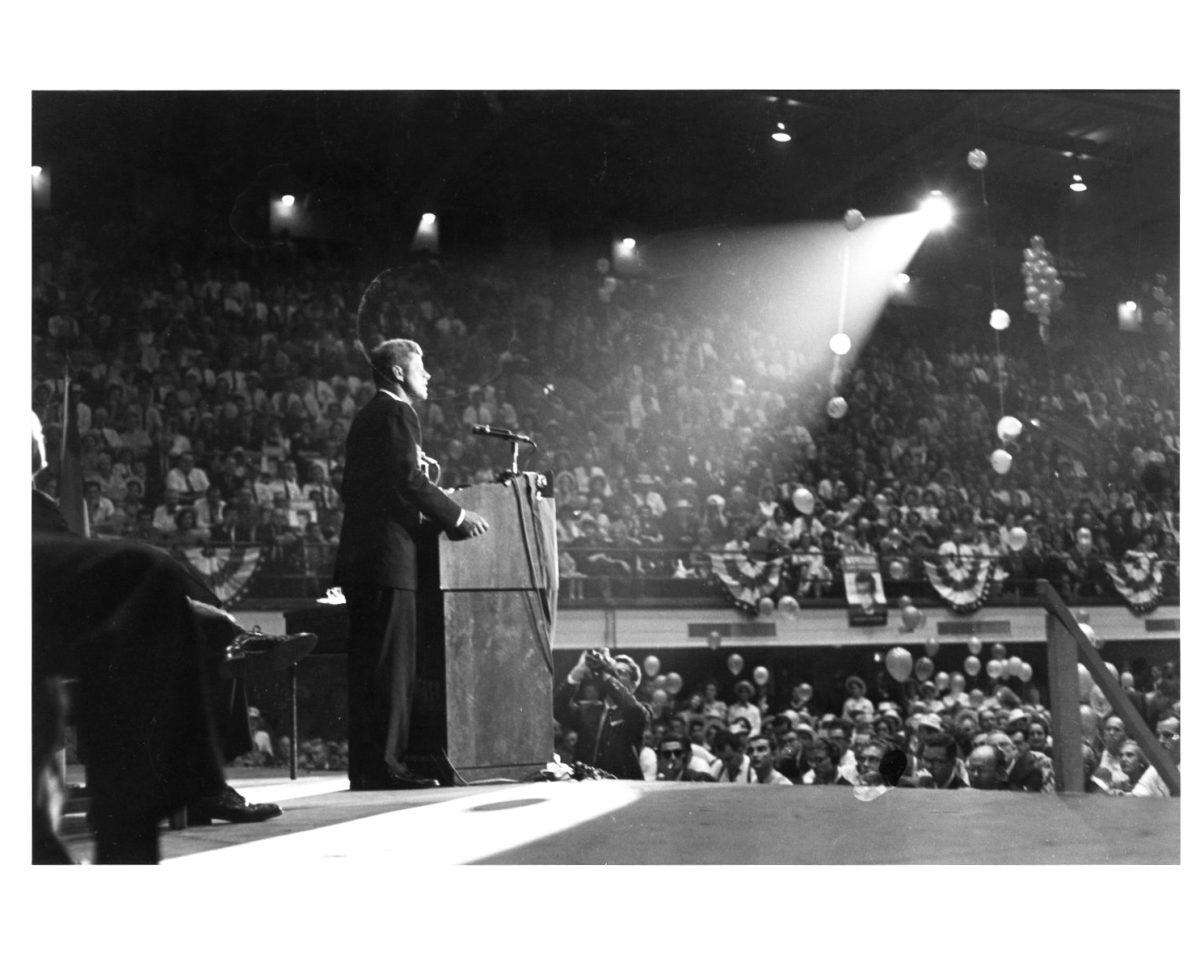Fifty years ago today, the Bell Tower played the National Anthem in honor of President John F. Kennedy five hours after he was assassinated in Dallas.
N.C. State students who heard about the shooting earlier that day “dashed to Union and dormitory television sets and radios to listen in disbelief as the confirmation of the President’s death was announced,” the Technician reported on Nov. 25, 1963.
At age 43, he was the youngest-elected president, the first and only Catholic president and the first presidential candidate to actively use pop culture and television.
Professor of history David Zonderman said that in a nation accustomed to older presidential candidates, Kennedy’s young age inspired youth engagement in politics.
“Kennedy had a youthful, new-thinking image,” Zonderman said. “There’s no doubt, on a broad cultural level, that a lot of college-aged students were very excited about Kennedy.”
Kennedy’s new ideas, such as the Peace Corps, contributed to his young and dynamic image, Zonderman said.
Zonderman said that Kennedy’s death was disillusioning to college students.
“His assassination was a real shock,” Zonderman said. “It hit young people particularly hard, because they were so excited about Kennedy and the possibilities of politics.”
Young Americans perceived Kennedy to be the country’s great hope to advance civil rights, Zonderman said. However, his efforts to appeal to both the progressive young Democrats and older, white Democrats of the South, made his effect in Congress minimal.
“Kennedy was actually a very cautious politician,” Zonderman said. “He only won by about 100,000 votes, and what he accomplished in office was limited.”
Michael Cobb, a professor of public and international affairs, said Kennedy’s support of civil rights helped attract younger voters, but he failed to make real legislative progress while in office.
Even though Kennedy was not able to pass many laws himself, due to racist obstructionism, his death made it possible for President Lyndon B. Johnson to enact a several pieces of civil rights legislation, including the Civil and Voting Rights Acts, Cobb said.
“[The Voting Rights Act] was the most successful piece of public policy legislation involving voter enfranchisement ever,” Cobb said. “There was a massive enrollment of black voters post 1965.”
Events in the aftermath of Kennedy’s assassination, including debates about the Vietnam War and the Watergate scandal, caused young people to adopt a cynical view of government that still holds as American citizens distrust the government, Zonderman said.
“Kennedy’s death was the first blow,” Zonderman said. “[After his death], young people split—some got deeply involved in the political system, others were disillusioned and active in protests, and a small wing dove off into violence.”
The surge of young people’s political participation after Kennedy’s death led to more visible results involving the direct role of U.S. youth in the democratic system.
“The focus on youth voting didn’t really take place until after Vietnam, when you had this question of 18-year-olds being sent to potentially die in a war but not being able to vote,” Cobb said.
In a similar way to Kennedy, President Barack Obama captured the attention of young people by publically supporting the needs and interests of college students, such as affordable education, student loan reform and sustainable energy, Zonderman said.
According to an exit poll analysis released Nov. 4 by CIRCLE, a nonpartisan research center at Tufts University, between 22 million and 24 million people aged 18 to 29 voted in the 2008 presidential election. The election had one of the largest voter turnouts for that demographic in U.S. history, second only to the 1972 presidential election, which was the first time 18-year-olds were eligible to vote.
In 2008, 66 percent of young people voted for Obama, and he received 60 percent of that voting bloc in 2012.
According to U.S. News, Obama would have lost the election if he had not won the majority of young voters in the 2012 election against Republican candidate Gov. Mitt Romney of Massachusetts.
Zonderman said that young people today are engaging in politics in various ways, such as the recent Elizabeth City State University senior, Montravias King, who campaigned for and won a position on the city board.
Though Kennedy’s administration inspired young people to participate in government, certain pieces of legislature recently enacted in North Carolina are attempting to do just the opposite.
Recently, the North Carolina General Assembly enacted laws making it difficult for younger people to vote, Cobb said.
“There are very few plausible arguments why it’s a problem that 16 or 17-year-olds can be pre-registered to vote, but that is exactly what the legislature just did,” Cobb said.
Other enacted laws have attempted to curb young voters, which included eliminating same-day voter registration and no longer allowing student IDs to be an acceptable form of voter ID.
“Same day registration is a more common way that young people are integrated into voting,” Cobb said. “It’s just less of a hassle if you can show up and register and vote on the same day as opposed to figuring out how to pre-register 30 days in advance of an election and then to show up and vote in the proper area.”
Cobb said young people are less likely to have a passport or a driver’s license, which are the most common forms of identification that will now be accepted.
The cultural shift toward youth engagement in politics that began with Kennedy’s election is something that should not be prevented by voter ID laws, Zonderman said.
“With legislation that might cut funding to public universities, N.C. State students should want to be involved in politics to ask legislatures why they are doing this,” Zonderman said. “Eighteen-year-olds should be ready to vote and excited about it because elections do matter.”








